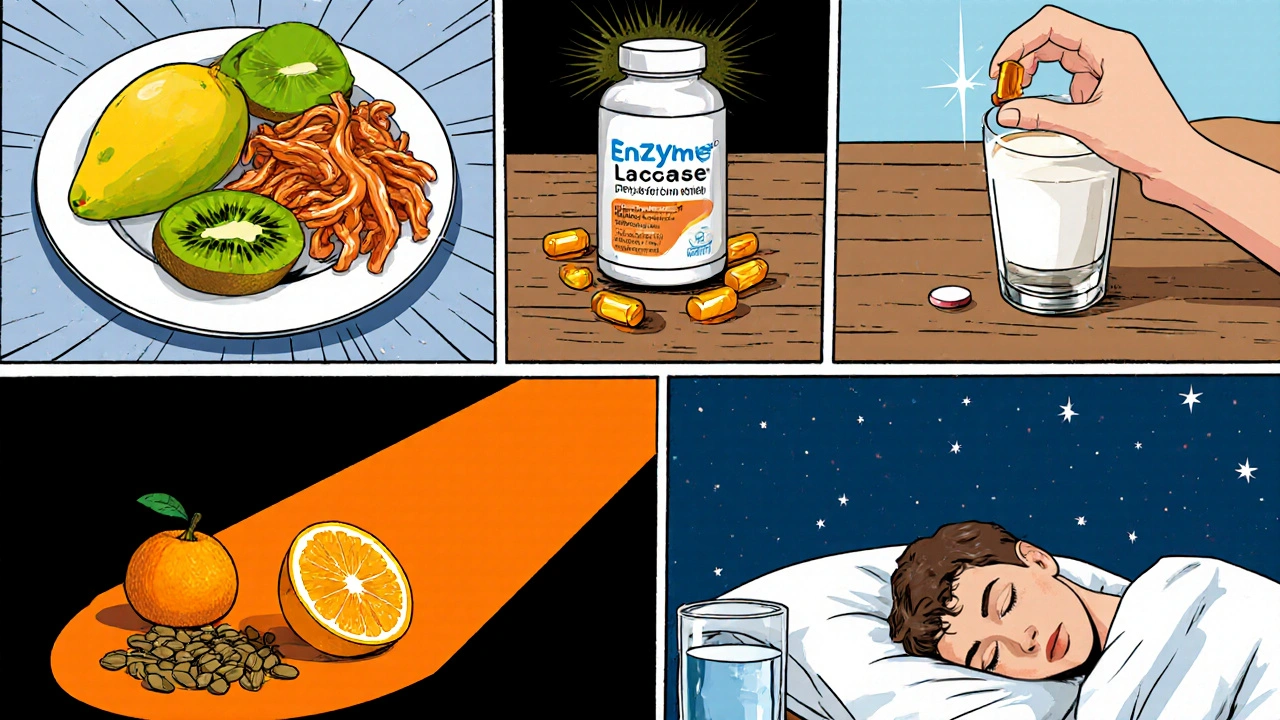
Enzyme Deficiency Symptom Checker
Check Your Enzyme Health
Answer these questions to identify potential enzyme deficiencies and get personalized support tips.
When your body suffers from enzyme deficiency is a condition where the production or activity of digestive enzymes falls below optimal levels, limiting the breakdown of food and nutrient absorption, your immune defenses can take a hit. enzyme deficiency isn’t just a gut issue - it ripples through every part of your health.
Key Takeaways
- Enzymes are vital for breaking down food, unlocking nutrients that power immune cells.
- A shortage of enzymes can impair the gut microbiome, raise inflammation, and lower resistance to infections.
- Common deficiencies include lactase, amylase and protease, each with distinct symptoms.
- Boosting enzymes involves enzyme‑rich foods, targeted supplements, and lifestyle tweaks like stress control.
- Supporting the immune system also means covering vitamins, minerals, and probiotic diversity.
How Enzymes Keep Your Immune System Running
Enzyme is a biological catalyst that speeds up chemical reactions in the body, especially those that break down proteins, fats, and carbohydrates. By turning complex foods into simple nutrients, enzymes feed immune cells such as lymphocytes and macrophages. For instance, the amino acids released by protein digestion become the building blocks for antibodies.
Immune system is the network of cells, tissues, and organs that defends the body against pathogens, toxins, and abnormal cells. Its efficiency hinges on a steady supply of vitamins, minerals, and short‑chain fatty acids produced by gut bacteria - all of which depend on proper enzymatic activity.
When Enzyme Production Drops: The Immune Fallout
Low enzyme output creates a cascade of problems:
- Malabsorption: Undigested food particles stay in the gut, feeding harmful microbes.
- Gut microbiome disruption: Gut microbiome is the community of trillions of bacteria, fungi, and viruses living in the digestive tract relies on readily available nutrients. When enzymes falter, beneficial bacteria lose fuel while opportunistic species thrive, leading to dysbiosis.
- Chronic inflammation: Dysbiosis triggers the release of pro‑inflammatory cytokines, which can suppress the activity of white blood cells.
- Weakened barrier function: A leaky gut allows toxins to enter the bloodstream, forcing the immune system into a constant state of alert.
Over time, these stressors make you more susceptible to colds, flu, and even autoimmune flare‑ups.

Common Enzyme Deficiencies and Their Signs
Three enzymes frequently fall short in adults:
- Lactase is the enzyme that breaks down lactose, the sugar found in milk and dairy products. Low lactase often causes bloating, gas, and diarrhea after dairy.
- Amylase is an enzyme that converts starches into simple sugars like glucose. Amylase deficiency can lead to lingering fatigue after carb‑heavy meals and vague abdominal discomfort.
- Protease is a group of enzymes that split proteins into amino acids. Without enough protease, you may notice muscle soreness, slower wound healing, and weakened immunity.
If you experience any of these patterns repeatedly, it’s worth checking your enzyme status with a healthcare professional.
Practical Ways to Restore Enzyme Balance
Here are three pillars to get your enzymes back on track:
1. Eat Enzyme‑Rich Foods
- Pineapple (contains bromelain, a protease)
- Papaya (contains papain, another protease)
- Fermented foods like kimchi, sauerkraut, and kefir - they bring live microbes that produce their own enzymes.
- Ripe fruits such as mango and kiwi, which are natural sources of amylase.
2. Targeted Enzyme Supplements
When diet alone isn’t enough, a well‑chosen supplement can fill the gap. The table below compares popular options:
| Product | Primary Enzyme(s) | Typical Dose | Best For |
|---|---|---|---|
| Lactase tablets | Lactase | 1-3 tablets before dairy | Dairy intolerance |
| Bromelain caps | Bromelain (protease) | 500mg with meals | Protein digestion, inflammation |
| Broad‑spectrum digestive blend | Amylase, protease, lipase, lactase | 1-2 capsules per meal | General digestive support |
3. Lifestyle Tweaks That Preserve Enzyme Activity
- Chew food thoroughly - saliva contains amylase that starts starch breakdown.
- Avoid chronic stress; cortisol can suppress pancreatic enzyme secretion.
- Stay hydrated - enzymes need water to function optimally.
- Get 7‑9hours of sleep; restorative sleep supports the pancreas and gut lining.

Strengthening Immunity While You Rebalance Enzymes
Even as you work on enzymes, give your immune system a direct boost:
- Vitamin C is an antioxidant that supports white‑blood‑cell function and helps regenerate other antioxidants. Aim for 100-200mg daily from citrus, berries, or a supplement.
- Zinc is a trace mineral essential for the development and communication of immune cells. Foods like pumpkin seeds, oysters, and beef provide 8-11mg per day.
- Probiotics are live microorganisms that, when consumed in adequate amounts, confer a health benefit on the host. A daily dose of 1-10billion CFU supports a balanced gut microbiome, indirectly aiding enzyme production.
- Regular moderate exercise improves circulation, helping immune cells patrol the body more efficiently.
Quick Checklist: ‘Enzyme‑Immune Health’ Routine
- Include at least two enzyme‑rich foods in each meal.
- If you’re lactose‑sensitive, take a lactase tablet before dairy.
- Consider a broad‑spectrum digestive supplement for the first month.
- Add a vitamin C source (fruit or supplement) and 15mg of zinc daily.
- Take a probiotic with 5billion CFU each morning.
- Practice mindful chewing, stay hydrated, and aim for 8hours of sleep.
- Track symptoms - note any reduction in bloating, fatigue, or recurrent colds.
Frequently Asked Questions
Can enzyme deficiency cause frequent colds?
Yes. When enzymes don’t break down food properly, nutrients essential for immune cells-like zinc, vitaminA, and amino acids-are poorly absorbed. This creates a nutrient gap that makes you more prone to viral infections.
How do I know if I need a protease supplement?
If you often feel sore after meat or plant‑protein meals, notice slow recovery from workouts, or have lingering digestive discomfort after protein‑rich foods, a protease supplement like bromelain or a broad‑spectrum blend can help.
Is it safe to take multiple enzyme supplements together?
Generally, yes. Enzyme supplements target different substrates, so they don’t compete. However, start with the lowest recommended dose and watch for any gastrointestinal upset.
Do probiotics actually increase my own enzyme production?
Certain probiotic strains (e.g.,Lactobacillus plantarum) secrete enzymes like amylase and protease, supporting the host’s digestion. Over time they can also stimulate the pancreas to release its own enzymes.
Should I get tested for enzyme deficiency?
If symptoms are persistent, ask your doctor for a stool test that measures pancreatic elastase (a marker of overall enzyme output) or a breath test for lactose intolerance. These give a clearer picture than guesswork.

16 Comments
Great summary! Enzyme health is key, and your tips are spot‑on. Keep it up!
Dude, you nailed the gut‑immune link. I’d add that stress really kills enzyme output, so cut the caffeine!
I really appreciate the clear breakdown of how enzymes feed immune cells. It’s fascinating how a simple bite of pineapple can support protease activity. Also, chewing thoroughly is such an easy habit that many overlook. Pairing that with a probiotic can amplify the benefits you mentioned. Keep sharing these practical steps!
If enzymes are the unseen workers, then deficiency is the silent rebellion within.
Love the vibe here! Enzyme‑rich foods are like colorful paint for our immune canvas. Toss in some papaya and let the proteases dance.
Our bodies are built strong so dont let some enzyme lag bring us down yall
Nah, I think it’s all hype.
Hey, that checklist is super useful! I’ve started adding a splash of kefir to my morning routine and notice less bloating. Also, the reminder to chew well really changed my digestion. Keep these actionable tips coming.
The interplay between enzymatic activity and immunological competence constitutes a complex biochemical network worthy of rigorous scrutiny.
Deficiencies in proteolytic, amylolytic, or lactase enzymes precipitate a cascade of malabsorption phenomena that compromise substrate availability for lymphocyte proliferation.
Consequently, the host's adaptive immune response may be attenuated owing to suboptimal amino acid pools.
Furthermore, the dysbiotic milieu arising from undigested macromolecules engenders endotoxemic translocation, which perpetuates systemic inflammatory signaling.
Such cytokine surges are known to modulate leukocyte trafficking and impair phagocytic efficacy.
Empirical studies delineate a correlative relationship between reduced pancreatic elastase output and heightened susceptibility to opportunistic infections.
From a therapeutic perspective, exogenous enzyme supplementation serves to reconstitute the catalytic milieu, thereby facilitating nutrient assimilation.
Nevertheless, clinicians must calibrate dosing regimens to individual phenotypic variability to avert iatrogenic hyperenzymemia.
Adjunctive strategies, including prebiotic fiber enrichment, have been demonstrated to potentiate endogenous enzymatic expression via epigenetic modulation.
Moreover, adequate hydration is indispensable for optimal catalytic kinetics, as solvent dynamics directly influence substrate diffusion.
In parallel, the incorporation of vitamin C and zinc fortifies oxidative burst mechanisms integral to pathogen neutralization.
Probiotic consortia, particularly strains of Lactobacillus plantarum, secrete ancillary enzymes that synergize with host secretions.
Chronobiological considerations also merit attention; circadian alignment of digestive secretions enhances metabolic efficiency.
Sleep deprivation, by contrast, suppresses pancreatic exocrine output through sympathetic overdrive.
Therefore, a multimodal regimen encompassing dietary enzymes, micronutrient repletion, gut microbiome stewardship, and lifestyle optimization constitutes the cornerstone of immunological resilience.
In sum, addressing enzyme deficits is not merely a gastrointestinal concern but a pivotal determinant of systemic immune vigor.
That deep dive really ties the gut to the whole immune orchestra. Adding a daily probiotic can be the backstage crew that keeps the enzymes humming.
Good points on supplement timing.
While the article is informative, it neglects to cite primary literature regarding the enzyme‑immune correlation; such omissions undermine its scientific credibility.
Enzymes are like silent architects building our health they work behind the scenes unseen yet vital
In many cultures, fermented foods have been staples for centuries, illustrating the timeless wisdom of supporting enzymatic digestion.
Honestly, most people ignore the simple fact that without proper enzyme function, even the best supplements are wasted; you need to assess baseline levels before any regimen.
The notion of enzymatic symbiosis aligns with the philosophical construct of emergent functionality, where micro‑level biochemical interactions precipitate macro‑level immunological robustness. By conceptualizing enzymes as semi‑autonomous agents within a cooperative network, we appreciate the dialectic between host and microbiota.